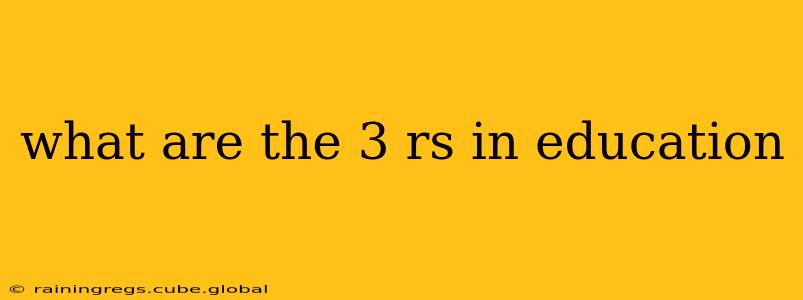The "3 Rs" – Reading, 'Riting (Writing), and 'Rithmetic (Arithmetic) – represent the foundational pillars of traditional education. While their prominence has evolved with modern pedagogical approaches, they remain crucial components of a well-rounded education, laying the groundwork for future learning and success. This article will explore each "R" in detail, examining their contemporary relevance and significance.
What is Reading in Education?
Reading is far more than simply decoding words on a page. It's the gateway to knowledge, imagination, and critical thinking. Effective reading instruction encompasses:
- Phonemic Awareness: Understanding the sounds of language and how they relate to letters and words. This is crucial for early literacy development.
- Phonics: Connecting letters and letter combinations to their corresponding sounds to decode words.
- Fluency: Reading smoothly and accurately with appropriate expression. This allows for comprehension and enjoyment.
- Vocabulary Development: Building a rich vocabulary allows for deeper understanding of complex texts.
- Comprehension: Understanding the meaning of what is read, including identifying main ideas, drawing inferences, and analyzing text structure.
Beyond basic literacy, reading skills are essential for success in all academic disciplines. Students need to read textbooks, research papers, and various other materials to acquire knowledge and complete assignments.
What is Writing in Education?
Writing is more than just forming letters; it's a powerful tool for self-expression, communication, and critical thinking. Effective writing instruction involves:
- Handwriting/Typing: Developing legible handwriting or proficient typing skills is essential for expressing ideas clearly.
- Grammar and Mechanics: Understanding the rules of grammar and punctuation allows for clear and effective communication.
- Composition: Organizing thoughts and ideas into coherent and engaging written pieces.
- Different Writing Styles: Mastering various writing styles (narrative, persuasive, expository, descriptive) broadens a student's ability to communicate effectively in diverse contexts.
- Critical Thinking: Writing encourages critical analysis and evaluation of information.
The ability to write clearly and persuasively is crucial for academic success, future careers, and effective communication in all aspects of life.
What is Arithmetic in Education?
Arithmetic, the foundation of mathematics, involves basic numerical operations: addition, subtraction, multiplication, and division. It's essential for:
- Number Sense: Understanding the meaning of numbers and their relationships.
- Problem-Solving: Applying mathematical concepts to solve real-world problems.
- Logical Reasoning: Developing logical thinking skills through mathematical exercises.
- Data Analysis: Interpreting numerical data and drawing conclusions.
- Foundation for Higher Math: Arithmetic provides a crucial foundation for advanced mathematical concepts in algebra, geometry, calculus, and beyond.
A strong grasp of arithmetic is not just important for future mathematical studies; it's vital for managing finances, understanding data, and making informed decisions in everyday life.
Beyond the 3 Rs: The Modern Educational Landscape
While the 3 Rs remain foundational, modern education recognizes the importance of other crucial skills, including critical thinking, problem-solving, creativity, collaboration, and digital literacy. These skills complement the traditional 3 Rs, preparing students for a rapidly changing world.
How Have the 3 Rs Evolved?
The methods of teaching the 3 Rs have significantly evolved over time. Modern approaches emphasize hands-on activities, interactive learning, technology integration, and differentiated instruction to cater to diverse learning styles. The focus is on fostering a deeper understanding of concepts rather than rote memorization.
What are the other essential skills besides the 3 Rs?
Beyond the traditional 3 Rs, modern education emphasizes a broader range of skills, including critical thinking, problem-solving, creativity, collaboration, and digital literacy. These skills are essential for success in the 21st-century workplace and beyond.
In conclusion, while the 3 Rs might seem simple at first glance, they represent the core building blocks of a solid education. Their continued relevance in modern teaching methodologies underscores their lasting importance in preparing students for success in all aspects of life.
